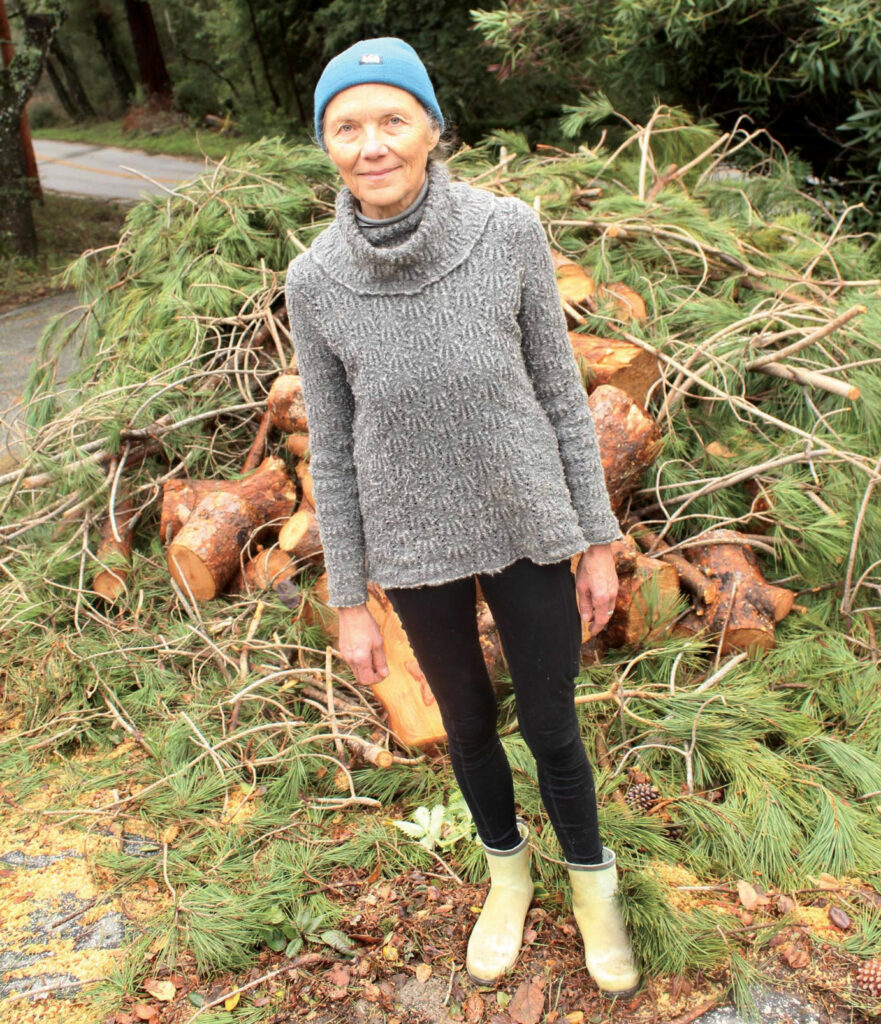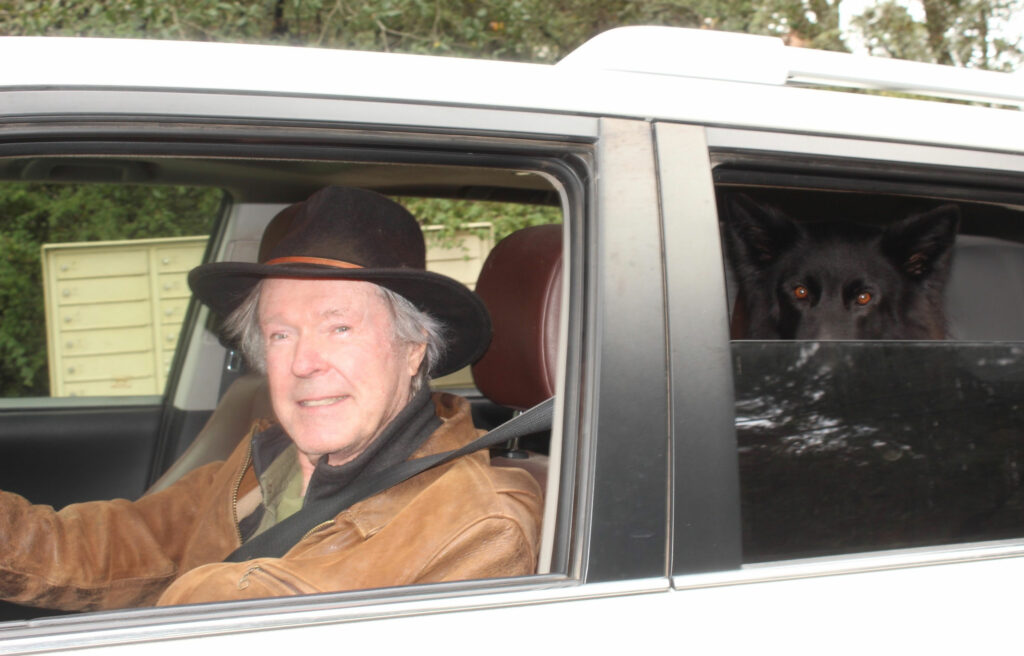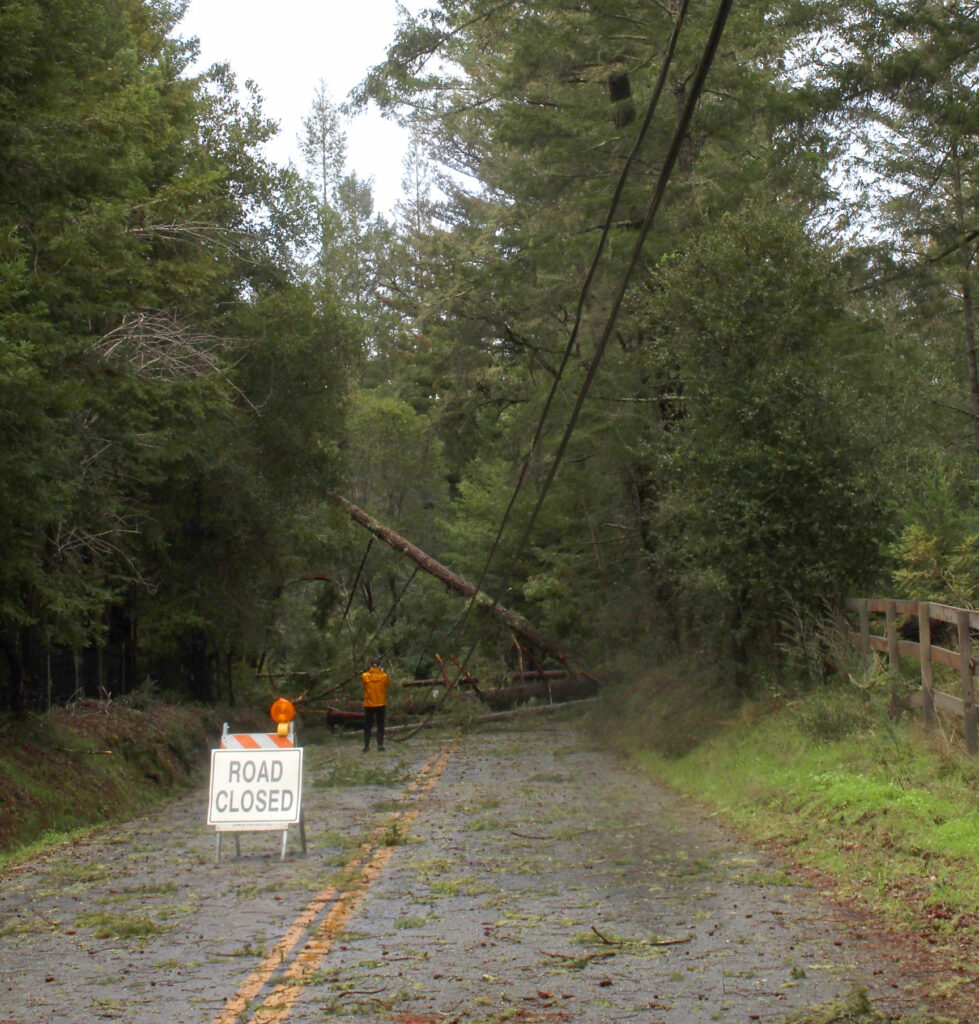
In the face of massive storms, Helena Powell’s home on Quail Drive at Pine Flat Road hasn’t been impacted as badly as some, but she still had her hands full.
On Tuesday afternoon, Powell stood beside a large pine tree that used to be rooted right across the road from her house that was now neatly arranged in discs, chunks and beds of green needles.
“It was fine for the first storm,” she said, noting the second tempest—the night of Jan. 4—is what did it in.
After the tree collapsed, there was still enough room for her to get her little car out of the driveway and book it to the coast in search of Wi-Fi to alert the community to her situation.
“I posted it on the Bonny Doon Facebook site,” Powell said. “By the time I got home, people were cutting it up.”
Did she prepare for a big storm like this?

“Not well,” she admits, noting that it’s now a week later and the power was still out.
She had a generator, for example, but she wishes she’d done more to keep it in working order.
“I had to drain all the old gas out of it,” she said, recalling the hours she spent driving down the hill to the Pacific to be able to educate herself about what to do through YouTube videos. “I’ve never used a generator until the fire.”
That’s the backdrop to this most recent act of Mother Nature—the lightning-sparked 2020 fires that devoured over 900 homes in the area.
Powell’s generator was now running—out of earshot—behind the house.
“It’s purring,” she said, satisfied, as a neighbors’ put humming tones into the wild and typically quiet Bonny Doon landscape.
She also took other measures mid-storm.
“I had to get a bunch of sandbags,” she said. “The water was building up against the foundation.”
And Powell dug a couple trenches to divert the water away.
But she says she really doesn’t have it that bad. Others have had branches puncture their homes.
“Trees are falling like crazy up here,” she said.

Stan Moore, a neighbor, and his black German shepherd Tess, drove up. Moore stuck his head out the window to check on Powell.
He had his own emergency vegetation management situation to deal with, he explained.
“A tree started leaning; I had to have it taken down,” he said. “It was obviously going to fall. Fortunately, we cut it down before it did any damage.”
Both of them turned to another Bonny Dooner—contractor Steve Sohl—who came to the rescue to help cut up the trunks and limbs.
“He does stuff for me all the time,” remarked Powell.
Moore said Tess has been feeling cooped up, partly because runs on the beach are out of the question for the time being—because of how crazy the surf has been.
“Tess doesn’t want to be anywhere near it,” he said.
Moore, too, has been having generator issues. He has a small-capacity machine that isn’t big enough to power his 240-volt water system.
“It’s just a pain in the ass,” he said. “It’s country living.”
Powell has solar panels—an investment that’s finally starting to pay off—but she doesn’t have a way to save the energy for when there’s no UV light available.
“Some people have Tesla Powerwalls, which is pretty nice,” she said. “I have solar, but I don’t have storage.”

Over on Smith Grade, Norman Williams surveyed the site of a landslide that had already been tidied up.
“You can see where the slide was,” he said, pointing to the clay-colored—but clear—roadway, just below a stand of trees still bearing their scars. “This is where the fire was. It never crossed Smith Grade.”
He thinks the landslide was caused by the transition from drought to intense rain.
“It seems like the weather is more volatile these days,” he said. “I could be wrong, but I don’t think so.”
Williams said he was pleased with how quickly the mess got cleaned up by contractors, including a Graniterock crew.
“We didn’t expect it,” he said. “The neighborhood was kind of surprised we had such a good response from the County.”
After all, it’s been a stressful time, he noted.
“Everyone’s on edge,” he said. “It’s been days and days since I’ve been to town.”
As far as he knew, his road was still blocked a little further down.
“I don’t think you can get to Empire Grade,” he said, adding he knows things could have been worse. “We kinda dodged a bullet.”
For example, he had a couple trees come down, and the creek swelled to a river.
“We had to yell to talk,” he said. “That creek was just raging.”
He can’t remember a storm that was this bad since the one in 1982.
“We’ve been out of power,” he said. “You get tired of it.”

Further along, there indeed was a massive Douglas fir pinning communication wires to the road below it.
“It happened this morning,” said Ted Benhari. “People around here have taken it upon themselves to get it cleaned up, but a lot of this is more than the people can handle.”
The Smith Grade residents have been trying to keep each other up-to-date about what’s happening in their little corner of the universe.
“We have a neighborhood email group that pretty much logs what’s going on,” he said. “There was a lot of wind last night. Some really strong gusts.”
Jeff Denholm rolled up in a truck bearing a Strong Water Tech logo on the side.
“We’re usually last on the list on this road,” he said, referring to how the remoteness of the community impacts public service availability. “This is by far the worst weather I’ve seen yet.”
Denholm, a federal contractor, actually helped battle the CZU Lightning Complex flames when they ravaged the region.
“We fought the fire here for a week,” he recalls. “We’ve been through our trials and tribulations in these hills.”
Denholm told Benhari to give him a shout if a wildfire breaks out again.
“The fires just move too fast now,” he said. “If the shit hits the fan with the fire, just text me.”
A man in a tie-dye shirt appeared and began dissecting the massive obstacle and was making serious progress. He cussed when his chainsaw got stuck and went to grab one of his wedges to pry it out.
Back down Smith Grade, a neighbor talking to Benhari who identified himself as Bill, put the severity of the situation in context—given the new storms looming in the forecast.
“Smith Grade’s been hammered,” he said. “It could disappear at any moment.”











